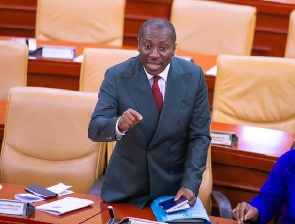Health News of Wednesday, 15 February 2023
Source: www.ghanaweb.com
The silent killer: 3 major reasons Afenyo-Markin wants Hepatitis B included on the NHIS
In 2019, the World Health Organisation stated that an estimated 820,000 people died from liver cancer induced by Hepatitis B.
Described as one of the most silent killers in medical circles, the deadly disease has continued to devastate nations and cripple many families.
And that was the concern of the Deputy Majority Leader in Parliament, Alexander Kwamena Afenyo-Markin, when he addressed the House on Tuesday, February 14, 2023.
Painting a worrying picture of how the disease continues to destroy many lives across the world, the deputy leader, who is also the Member of Parliament for Effutu, called for urgent attention to be given to it, ensuring that it is tackled from the roots.
He stressed that it should be a matter of grave concern, particularly because many people living with the disease are not even aware of it.
“This situation is not only unfortunate but troubling. Indeed, the problem around the country is equally frightening. It is estimated that the national prevalence of chronic Hepatitis B virus stood somewhere between 8.36% (in 2020) and 12.30% (in 2016).
“On the whole, some 3 to 4.6 million people are said to be suffering from chronic Hepatitis B infection in Ghana. Unfortunately, the majority of those living with the virus do not know their status. This is the case even though science and medicine have developed to a point where it is possible to eliminate the virus,” he said.
In the breakdown, the WHO estimates that “approximately two people die each minute from hepatitis B—this translates to one person every 30 seconds.”
The Ghana situation:
Expanding his statements on the subject with statistics from his constituency, Effutu, Alexander Afenyo-Markin said that the Hepatitis B story in Ghana is a ‘troubling’ one.
With as many as 4.6 million Ghanaians suffering from the chronic disease, he stated that not even advancements in science and medicine have helped much.
“The situation in Ghana is equally dire. For example, in my constituency, Effutu, a survey I commissioned in 2019 showed the prevalence rate of the virus at 8.5 percent. This situation is not only unfortunate but also troubling.
“Indeed, the problem around the country is equally frightening. It is estimated that the national prevalence of chronic Hepatitis B virus stood somewhere between 8.36% (in 2020) and 12.30% (in 2016). On the whole, some 3 to 4.6 million people are said to be suffering from chronic Hepatitis B infection in Ghana.
“Unfortunately, the majority of those living with the virus do not know their status. This is the case even though science and medicine have developed to a point where it is possible to eliminate the virus,” he added.
Besides, the Coalition for Global Hepatitis B Elimination has painted a further worrying picture for the country.
According to the MP, the Coalition paints a gloomy picture for Ghana, as it has no national elimination plan for the disease in the country.
“Unfortunately, the Coalition for Global Hepatitis B Elimination suggests that Ghana does not presently have a national Hepatitis B (HBV) or C (HCV) elimination plan. Although the country released the Ghana National Policy on Viral Hepatitis, this was before the WHO elimination goals came into force,” he added.
He also raised concerns about the fact that in Ghana, just as in other low-income countries, most people with liver cancer, which is induced by Hepatitis B, die early because they don’t receive early detection of the disease.
But even more scary are the estimates that were released by the Ghana Health Service for the year 2020.
According to the statement read by the MP, the GHS believes that newborns, numbering up to 120,000, are at high risk of being exposed to Hepatitis B.
The report added that even more concerning is the fact that, should this trend of disease infections not be curtailed, only 10% of newborns may be free from not eventually contracting the deadly disease.
“Indeed, estimates released by the Ghana Health Service in 2020 show that an average of 120,000 newborns will be exposed to the Hepatitis B virus by their mothers during delivery. Also, up to 90% of Ghana's newborns may end up being infected at some point,” he added.
What Ghana should do:
Although the situation in Ghana appears dire, the Deputy Majority Leader, Alexander Kwamena Afenyo-Markin, however, believes that it can be tackled head-on.
He believes, however, that if some urgent measures are put in place, Hepatitis B can be promptly dealt with in the country.
The Deputy Majority Leader outlined some three major pointers that he believes will get this plan properly underway.
The most important of them, he stated, should be that the testing and treatment of Hepatitis B and its related conditions should be included in the National Health Insurance Scheme (NHIS).
1. “Firstly, Mr Speaker, Ghana must prioritise and scale up Hepatitis B elimination prevention, testing and treatment programs to ensure that no one is left behind.
“Experts say that the most potent means of stopping mother-to-child transmission include the use of Hepatitis B Immunoglobulin (HBIG) and vaccination with a birth dose of the Hepatitis B vaccine. It seems that these interventions are yet to be deployed in Ghana.
2. “Secondly, Ghana must take a bold decision to make viral Hepatitis B prevention, vaccination, testing and treatment part of the package of services for Universal Health Coverage (UHC) programs. In short, the NHIS should bear the cost of testing and treating Hepatitis B cases in the country.
“This approach is vital because most citizens, particularly pregnant women in rural communities, do not get routine, reliable and affordable access to Hepatitis B testing facilities during pregnancy.
3. “Thirdly (and finally), I respectfully urge you, Mr Speaker, to consider Ghana's grim situation, as highlighted here, and kindly refer this statement to a joint committee on Health, Finance and Social Welfare.
“Their task should be to consider and recommend to this honourable House the most viable means by which the NHIS can bear the cost of testing, vaccination and treatment of Hepatitis B cases in the long term without crippling the already overburdened scheme. Their report will guide legal and policy response to the plague in a way that helps Ghana decisively defeat the virus.”
Read the full statement made by Alexander Kwamena Afenyo-Markin on Tuesday, February 14, 2023, below:
You can also watch this episode of People & Places here:
AE/SEA











